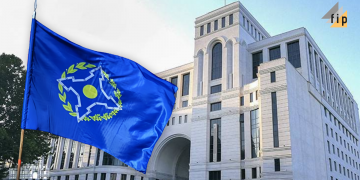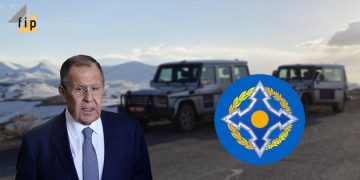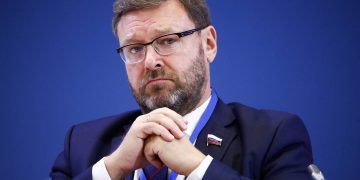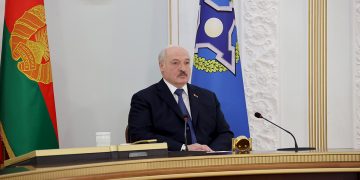If you are in a hurry, you can read brief information about the article here:
Armen Rustamyan, member of the “Armenia” faction of the National Assembly, stated that CSTO was ready to help Armenia “by all means” during the invasion of Azerbaijan. The Fact Investigation Platform has revealed that Rustamyan’s claim is actually wrong. Armenia turned to the CSTO both in May 2021 and in 2022 during Azerbaijan’s advancements on the sovereign territory of Armenia. CSTO representatives ruled out the possibility of providing military aid to Armenia. Moreover, they claimed that the border between Azerbaijan and Armenia is not demarcated, so “it is difficult to talk of any violation of the border”.
Armen Rustamyan, member of the Armenia faction of the National Assembly, told journalists on May 16 that CSTO was ready to help Armenia by “all means” during Azerbaijan’s invasion of Armenia’s sovereign territory, but Yerevan responded in a way as if the organization does not exist.
The Fact Investigation Platform investigated whether the CSTO expressed readiness to “be present by all means”.
The invasion of Azerbaijan and the application of the Armenian government to CSTO in May 2021
In May 2021, the Azerbaijani army advanced on the sovereign territory of Armenia in Syunik and Gegharkunik provinces. On May 14, Armenian Prime Minister Nikol Pashinyan officially appealed to the acting chairman of the CSTO Council to coordinate the positions of the CSTO member states within the framework of the second article of the treaty and to implement the mechanism of immediately starting emergency consultations in order to take measures to eliminate the threat.
On the same day, the CSTO Secretariat announced that they had received the application. “Consultations regarding the situation in Syunik province will be held in the coming days,” CSTO spokesman Vladimir Zaynetdinov told TASS.
However, the organization did not take any substantive action to support Armenia.
The September aggression of Azerbaijan and another appeal to CSTO from Yerevan
On September 13, 2022, the Azerbaijani army once again advanced on the sovereign territory of Armenia. As a result of the attack by the Azerbaijani army, 224 people were killed on the Armenian side, and hundreds were injured. Azerbaijan occupied about 150 square kilometers of the sovereign territory of Armenia.
The government of Armenia officially appealed to the CSTO under Article 4 of the Charter, as well as to Russia and the UN Security Council to restore its territorial integrity.
According to Article 4 of the CSTO Charter, “In the event of an act of aggression against any of the participating states, the remaining participating states will provide the necessary assistance, including military assistance, and will also provide support with the means at their disposal in exercising the right to collective defense in accordance with Article 51 of the UN Charter”.
On the same day, an extraordinary meeting of the CSTO Security Council was held via video conference, during which Pashinyan introduced the situation to the members of the organization.
The press release of the CSTO Secretariat stated that the secretariat has organized joint activities with the CSTO Joint Staff aimed at activating the CSTO mechanisms in order to settle the situation.
On September 14, the Foreign Ministry of CSTO member Kazakhstan announced that the issue of sending peacekeepers to Armenia is not yet on the CSTO agenda, and in order to get objective information, a decision was made for the Secretary General of the CSTO to travel to the Armenian-Azerbaijani border and get a complete picture of the situation on the spot, and then inform leaders of CSTO member states. Foreign Minister of Kazakhstan Mukhtar Tileuberdi even stated that the border between Azerbaijan and Armenia is not demarcated, so “it is difficult to talk of any violation of the border”.
On September 15, CSTO Chief of Staff, Colonel-General Anatoly Sidorov announced that the issue between Yerevan and Baku should be resolved by political and diplomatic means. CSTO decided to send a mission to Armenia to assess the situation on the spot. “There is no question of the use of military force, with the involvement of the CSTO, neither on September 13, nor yesterday, nor today and, I think, nor in the near future,” Sidorov said.
On October 12, Russian Foreign Minister Sergey Lavrov announced that the CSTO is ready to send observers to Armenia, and for that only the decision of the CSTO Council is needed. “The only thing that is required is the decision of the Collective Security Council, which must be convened by the CSTO presiding country, and the presiding country is Armenia, isn’t it?” Lavrov said.
On November 23, 2022, the regular session of the Collective Security Council was held in Yerevan under the chairmanship of the Republic of Armenia.
During the session, Nikol Pashinyan refused to sign the documents on the declaration of the CSTO Collective Security Council and joint measures to provide assistance to the Republic of Armenia. According to him, the draft was not sufficiently finalized. “Under these circumstances, the lack of a clear political assessment of the situation and failure to make the above-mentioned decision may mean not only CSTO’s refusal to fulfil its obligations as an ally, but also be interpreted by Azerbaijan as CSTO’s green light for further aggression against Armenia.”
After the meeting, CSTO General Secretary Stanislav Zas announced that the document on joint measures to provide support to Armenia by the CSTO is almost ready, but needs some revision.
According to “Azatutyun” radio station, in one of the speeches at the extended session, Pashinyan stated that Armenia’s membership in the CSTO did not in any way restrain Azerbaijan’s aggressive actions, in response to which Lukashenko said that “it was not their job to restrain Azerbaijan”, and offered to move towards Russian peace mediation, stressing that they can now resolve “this conflict, which can be repeated again”.
On January 10, 2023, Nikol Pashinyan announced that there will be no CSTO military exercises in Armenia this year, and that they are still waiting for specific assessments from the organization to have an idea of what is the area of responsibility of the alliance. “The CSTO does not record where that red line passes, it does not pass through Sotk-Khoznavar, it does not pass through Jermuk. Where does it pass? Until we find out, we will be in a situation that we will invite, we will say come, create a threat for the Turkish-Azerbaijani tandem for two days, rest on the third day, go back to your work on the fourth day, and we will remain here to face that tandem.”
In April 2023, the official representative of the Ministry of Foreign Affairs of the Russian Federation, Maria Zakharova, announced that the timeline of sending a CSTO mission to the Armenian-Azerbaijani border depends on Yerevan. “When they are ready, we will be able to return to substantive work to consolidate the specific methods of the organization’s observation mission; so the ball is in Yerevan’s side,” Zakharova said, adding that Russia is satisfied with Yerevan’s continued interest in receiving CSTO representatives.
On April 20, Nikol Pashinyan announced that Armenia is also ready for the deployment of the CSTO observation mission.
Thus, despite the fact that Azerbaijan violated the sovereign territory of Armenia several times, in connection with which Armenia filed an application to the CSTO, the organization has only referred to its readiness to send an observation mission. The CSTO member states have questioned the fact of encroachment on the borders of Armenia and have claimed that the organization is not going to provide military aid to Armenia. Therefore, MP Rustamyan’s claim is wrong.
Loosineh Voskanyan

 FACTOMETER
FACTOMETER










